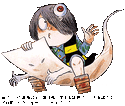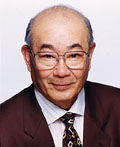No edit summary |
No edit summary |
||
| Line 18: | Line 18: | ||
|previous = [[GeGeGe no Kitarō (1968)|GeGeGe no Kitarō]] |
|previous = [[GeGeGe no Kitarō (1968)|GeGeGe no Kitarō]] |
||
|next = [[GeGeGe no Kitarō (1985)|GeGeGe no Kitarō]] |
|next = [[GeGeGe no Kitarō (1985)|GeGeGe no Kitarō]] |
||
| ⚫ | }}The second anime was aired from October 7, 1971 to September 28, 1972. It ran for 45 episodes. Produced only two years after the [[GeGeGe no Kitarō (1968)|first series]] and featuring the same main voice cast and theme songs, it is sometimes considered a colorized sequel to the first rather than a second entry in the series. Like the previous series, it was produced by [[Toei Animation]] and boradcast on [[Fuji Television]]. |
||
| − | }} |
||
| ⚫ | The second anime was aired from October 7, 1971 to September 28, 1972. It ran for 45 episodes. Produced only two years after the [[GeGeGe no Kitarō (1968)|first series]] and featuring the same main voice cast and theme songs, it is sometimes considered a colorized sequel to the first rather than a second entry in the series. Like the previous series, it was produced by [[Toei Animation]] and boradcast on [[Fuji Television]]. |
||
==About== |
==About== |
||
Because the 1971 anime is a sequel to the previous anime, no remake episodes were made. Because of this, nearly half of the episodes are actually adaptations of some of [[Shigeru Mizuki]]'s non-Kitarō stories. In the previous anime, this was only done twice towards the end of the run, with the episodes ''[[Series 1 Episode 62|Umi-Jijii]]'' and ''[[Series 1 Episode 63|Namahage]]''. Many of these stories were originally self contained and ironic, leaving little room for [[Kitarō]] to intervene. Some of these episodes featured Kitarō briefly and sometimes without him actually getting involved, deviating from the general "children's hero" theme of the rest of the series. On the other hand, because much more of the social satire and horror was left in this time around, it could be considered a more faithful adaptation of the essence of Mizuki's work. Of all the ''GeGeGe no Kitarō'' anime, this was the one to feature the most social commentary and irony. |
Because the 1971 anime is a sequel to the previous anime, no remake episodes were made. Because of this, nearly half of the episodes are actually adaptations of some of [[Shigeru Mizuki]]'s non-Kitarō stories. In the previous anime, this was only done twice towards the end of the run, with the episodes ''[[Series 1 Episode 62|Umi-Jijii]]'' and ''[[Series 1 Episode 63|Namahage]]''. Many of these stories were originally self contained and ironic, leaving little room for [[Kitarō]] to intervene. Some of these episodes featured Kitarō briefly and sometimes without him actually getting involved, deviating from the general "children's hero" theme of the rest of the series. On the other hand, because much more of the social satire and horror was left in this time around, it could be considered a more faithful adaptation of the essence of Mizuki's work. Of all the ''GeGeGe no Kitarō'' anime, this was the one to feature the most social commentary and irony. |
||
Revision as of 03:30, 7 November 2019

|
This article is a stub. You can help the GeGeGe no Kitarō Wiki by expanding it. |
The second anime was aired from October 7, 1971 to September 28, 1972. It ran for 45 episodes. Produced only two years after the first series and featuring the same main voice cast and theme songs, it is sometimes considered a colorized sequel to the first rather than a second entry in the series. Like the previous series, it was produced by Toei Animation and boradcast on Fuji Television.
About
Because the 1971 anime is a sequel to the previous anime, no remake episodes were made. Because of this, nearly half of the episodes are actually adaptations of some of Shigeru Mizuki's non-Kitarō stories. In the previous anime, this was only done twice towards the end of the run, with the episodes Umi-Jijii and Namahage. Many of these stories were originally self contained and ironic, leaving little room for Kitarō to intervene. Some of these episodes featured Kitarō briefly and sometimes without him actually getting involved, deviating from the general "children's hero" theme of the rest of the series. On the other hand, because much more of the social satire and horror was left in this time around, it could be considered a more faithful adaptation of the essence of Mizuki's work. Of all the GeGeGe no Kitarō anime, this was the one to feature the most social commentary and irony.
Another factor in this series being more mature and dramatic is that most of the Toei staff that worked on it was transferred from the recently completed Tiger Mask.
Unlike the previous anime, which was rarely rebroadcast, the 1971 anime was rebroadcast several times in the following years, usually during the summer.
While 45 episodes were produced, the original broadcast had a full 52 episode run thanks to many episode being aired as reruns. These episodes were Yōkai Cloth (rebroadcast March 16, 1972), Shibito-Tsuki (May 18, 1972), Ghosts of Angkor Wat (June 8, 1972), Gyūki (July 6, 1972), Gyaku-Mochi-Goroshi (August 3, 1972), Mammoth Flower (August 31, 1972), and Hell's Water (September 14, 1972).
In episode #4, Amefuri-Tengu, Medama-Oyaji's regular voice actor Isamu Tanonaka was sick and the role was performed by Hiroshi Ōtake. This was one of only two times in Tanonaka's lifetime where he didn't voice the character.
Theme Songs
- Opening
- Ending
Cast
| Main Cast | |||
|---|---|---|---|

|

|

|

|
| Masako Nozawa as Kitarō |
Isamu Tanonaka as Medama-Oyaji |
Chikao Ōtsuka as Nezumi-Otoko |
Yōko Ogushi as Neko-Musume |
| Recurring Cast | ||
|---|---|---|

|

|

|
| Keiko Yamamoto as Sunakake-Babaa |
Takuzō Kamiyama as Shinigami |
Kōji Yada as Konaki-Jijii |
Main Cast Notes
- Masako Nozawa, Isamu Tanonaka and Chikao Ōtsuka all return from the previous adaptation. They would go on to reprise their respective roles at various points throughout their careers, particularly Tanonaka, who voiced Medama-Oyaji in nearly every subsequent production of the franchise made within his lifetime.
- Yōko Ogushi had voiced Sunakake-Babaa in the previous adaptation. She would retire from voice acting and vanish from the public eye not too long after the series ended.
- Keiko Yamamoto and Kōji Yada voiced numerous guest characters in the previous adaptation. Yamamoto would go on to voice Shisa in the following adaptation as well as reprise the role of Sunakake-Babaa for the 1996 and 2007 adaptations.
Guest Cast
|
|
Episodes
| # | Title | Original airdate | Written by | Directed by | Animation director | Yōkai |
| 01 | Return of the Yōkai Yōkai Fukkatsu (妖怪復活) |
1971-10-07 | Shunichi Yukimuro | Tokue Shirane | Akinori Ōrai | Dorotabō |
|---|---|---|---|---|---|---|
| 02 | Yōkai Cloth Yōkai Tanmono (妖怪反物) |
1971-10-14 | Toyohiro Andō | Nobutaka Nishizawa | Hiroshi Azuma | Qi |
|---|---|---|---|---|---|---|
| 03 | The Great Yōkai Trial Yōkai Dai-Saiban (妖怪大裁判) |
1971-10-21 | Kaya Miyoshi | Yasuo Yamaguchi | Tsuguyuki Kubo | Momon-Jii |
|---|---|---|---|---|---|---|
| 04 | Amefuri-Tengu Amefuri-Tengu (雨ふり天狗) |
1971-10-28 | Masaki Tsuji | Takeshi Tamiya | Takeshi Shirato | Amefuri-Tengu |
|---|---|---|---|---|---|---|
| 05 | Ashi-Magari Ashi-Magari (あしまがり) |
1971-11-04 | Natsuyo Shibata | Isao Takahata | Toshio Mori | Ashi-Magari |
|---|---|---|---|---|---|---|
| 06 | Shibito-Tsuki Shibito-Tsuki (死人つき) |
1971-11-11 | Toyohiro Andō | Kazukiyo Shigeno | Makoto Kuniyasu | Shibito-Tsuki Mōryō |
|---|---|---|---|---|---|---|
| 07 | Neko-Mata Neko-Mata (猫又) |
1971-11-18 | Shunichi Yukimuro | Yoshikata Nitta | Akira Daikuhara | Jeeta Kitsune |
|---|---|---|---|---|---|---|
| 08 | Mammoth Flower Manmosu Furawā (マンモスフラワー) |
1971-11-25 | Masaki Tsuji | Tokiji Kaburaki | Hiroshi Azuma | Mammoth Flower Akaname |
|---|---|---|---|---|---|---|
| 09 | Kami-sama Kami-sama (髪さま) |
1971-12-02 | Natsuyo Shibata | Yasuo Yamaguchi | Fumio Etō | Kami-sama Kemedama |
|---|---|---|---|---|---|---|
| 10 | Ghosts of Angkor Wat Ankōru Watto no Bōrei (アンコールワットの亡霊) |
1971-12-09 | Shunichi Yukimuro | Nobutaka Nishizawa | Takeshi Shirato | Ghosts |
|---|---|---|---|---|---|---|
| 11 | Tsuchi-Korobi Tsuchi-Korobi (土ころび) |
1971-12-16 | Toyohiro Andō | Tokue Shirane | Takuo Noda | Tsuchi-Korobi |
|---|---|---|---|---|---|---|
| 12 | Yamata-no-Orochi Yamata-no-Orochi (やまたのおろち) |
1971-12-23 | Masaki Tsuji | Kazukiyo Shigeno | Akira Daikuhara | Yamata-no-Orochi Yobuko |
|---|---|---|---|---|---|---|
| 13 | Kamaboko Kamaboko (かまぼこ) |
1971-12-30 | Natsuyo Shibata | Hiroshi Shidara | Jōji Kikuchi | Han-Gyojin Giant Squid |
|---|---|---|---|---|---|---|
| 14 | Suspicious Car Kai Jidōsha (怪自動車) |
1972-01-06 | Kaya Miyoshi | Hiromi Yamamoto | Takeshi Shirato | Yōkai Car Sunekosuri |
|---|---|---|---|---|---|---|
| 15 | Gyūki Gyūki (牛鬼) |
1972-01-13 | Toyohiro Andō | Nobutaka Nishizawa | Fumio Etō | Gyūki |
|---|---|---|---|---|---|---|
| 16 | Invitation from the South Minami kara no Maneki (南からの招き) |
1972-01-20 | Masaki Tsuji | Yasuo Yamaguchi | Akinori Ōrai | Frogman |
|---|---|---|---|---|---|---|
| 17 | Divorce Insects Enkiri-Mushi (縁切り虫) |
1972-01-27 | Shunichi Yukimuro | Hiroshi Shidara | Takeshi Shirato | Enkiri-Mushi |
|---|---|---|---|---|---|---|
| 18 | A Monster Named Happiness Kōfuku toiu Na no Kaibutsu (幸福という名の怪物) |
1972-02-03 | Toyohiro Andō | Kazukiyo Shigeno | Makoto Kuniyasu | Jigoku-Dama |
|---|---|---|---|---|---|---|
| 19 | Kamanari Kamanari (釜鳴り) |
1972-02-10 | Masaki Tsuji | Hiromi Yamamoto | Fumio Etō | Kamanari |
|---|---|---|---|---|---|---|
| 20 | Fukuro-Sage Fukuro-Sage (ふくろさげ) |
1972-02-17 | Toyohiro Andō | Tokiji Kaburaki | Toshio Mori | Fukuro-Sage |
|---|---|---|---|---|---|---|
| 21 | Worry Shop Shinpai-ya (心配屋) |
1972-02-24 | Natsuyo Shibata | Tokue Shirane | Jōji Kikuchi | Bari-Bari |
|---|---|---|---|---|---|---|
| 22 | Hell's Water Jigoku no Mizu (地獄の水) |
1972-03-02 | Shunichi Yukimuro | Yasuo Yamaguchi | Takeshi Shirato | Mizugami |
|---|---|---|---|---|---|---|
| 23 | Reverse Mochi Murder Gyaku-Mochi-Goroshi (逆餅殺し) |
1972-03-09 | Toyohiro Andō | Tokue Shirane | Takuo Noda | Kasha |
|---|---|---|---|---|---|---|
| 24 | Kasa-Bake Kasa-Bake (傘ばけ) |
1972-03-23 | Masaki Tsuji | Yoshikatsu Kasai | Jōji Kikuchi | Kasa-Bake |
|---|---|---|---|---|---|---|
| 25 | The Phantom Train Maboroshi no Kisha (まぼろしの汽車) |
1972-03-30 | Natsuyo Shibata | Kazukiyo Shigeno | Takeshi Shirato | Pii Monroe |
|---|---|---|---|---|---|---|
| 26 | Ōkubi Ōkubi (大首) |
1972-04-06 | Shunichi Yukimuro | Nobutaka Nishizawa | Akinori Ōrai | Ōkubi Hone-Onna |
|---|---|---|---|---|---|---|
| 27 | Iyami Iyami (いやみ) |
1972-04-13 | Toyohiro Andō | Hiromi Yamamoto | Takeshi Shirato | Iyami |
|---|---|---|---|---|---|---|
| 28 | Akaname Akaname (あかなめ) |
1972-04-20 | Masaki Tsuji | Hiroshi Shidara | Kazuo Komatsubara | Akaname |
|---|---|---|---|---|---|---|
| 29 | Daidarabotchi Daidarabotchi (ダイダラボッチ) |
1972-04-27 | Natsuyo Shibata | Yasuo Yamaguchi | Makoto Kuniyasu | Daidarabotchi |
|---|---|---|---|---|---|---|
| 30 | Shinigami Shinigami (死神) |
1972-05-04 | Shunichi Yukimuro | Tokiji Kaburaki | Toshio Mori | Shinigami Witch |
|---|---|---|---|---|---|---|
| 31 | Akashita Akashita (赤舌) |
1972-05-11 | Toyohiro Andō | Yoshio Takami | Toshio Mori | Akashita Hone-Onna |
|---|---|---|---|---|---|---|
| 32 | Mokumokuren Mokumokuren (目目連) |
1972-05-25 | Masaki Tsuji | Tokue Shirane | Hiroshi Azuma Takeshi Shirato |
Mokumokuren |
|---|---|---|---|---|---|---|
| 33 | Akuma Buer Akuma Bueru (悪魔ブエル) |
1972-06-01 | Natsuyo Shibata | Yoshikata Nitta | Takuo Noda | Buer Yakanzuru |
|---|---|---|---|---|---|---|
| 34 | Shinigami and Satori Shinigami to Satori (死神とサトリ) |
1972-06-15 | Shunichi Yukimuro | Nobutaka Nishizawa | Takeshi Shirato | Shinigami Satori |
|---|---|---|---|---|---|---|
| 35 | Easter Island Epitaph Īsutā-tō Kidan (イースター島奇談) |
1972-06-22 | Toyohiro Andō | Kazukiyo Shigeno | Kazuo Komatsubara | Aku-Aku |
|---|---|---|---|---|---|---|
| 36 | Yōkai Mansion Yōkai Yashiki (妖怪屋敷) |
1972-06-29 | Masaki Tsuji | Hiroshi Shidara | Hiroshi Azuma | Kage-Onna |
|---|---|---|---|---|---|---|
| 37 | Chisōgan Chisōgan (地相眼) |
1972-07-13 | Natsuyo Shibata | Yoshikatsu Kasai | Akinori Ōrai | Ōmimizu others |
|---|---|---|---|---|---|---|
| 38 | Hidden Village of Shinigami Kakurezato no Shinigami (隠れ里の死神) |
1972-07-20 | Shunichi Yukimuro | Yasuo Yamaguchi | Kazuo Komatsubara | Shinigami Kakure-Zatō |
|---|---|---|---|---|---|---|
| 39 | Yōkai Waterwheel Yōkai Suisha (妖怪水車) |
1972-07-27 | Toyohiro Andō | Yoshio Takami | Toshio Mori | Mōrei-Yassan |
|---|---|---|---|---|---|---|
| 40 | Genshi-san Genshi-san (原始さん) |
1972-08-10 | Masaki Tsuji | Tokue Shirane | Hiroshi Azuma | Genshi-san |
|---|---|---|---|---|---|---|
| 41 | Spirit Surgery Reikei Shujutsu (霊形手術) |
1972-08-17 | Natsuyo Shibata | Yoshikata Nitta | Kazuo Komatsubara | Zunbera |
|---|---|---|---|---|---|---|
| 42 | Shinigami and Binbōgami Shinigami to Binbōgami (死神と貧乏神) |
1972-08-24 | Shunichi Yukimuro | Nobutaka Nishizawa | Makoto Kuniyasu | Shinigami Binbōgami |
|---|---|---|---|---|---|---|
| 43 | Suspicious Footprints Ashiato no Kai (足跡の怪) |
1972-09-07 | Toyohiro Andō | Kazukiyo Shigeno | Toshio Mori | Taitanbō |
|---|---|---|---|---|---|---|
| 44 | Amagami Yumuchaac Amagami Yumuchakku (雨神 ユムチャック) |
1972-09-21 | Masaki Tsuji | Yasuo Oibe | Hiroshi Azuma | Yumuchaac |
|---|---|---|---|---|---|---|
| 45 | Shinigami's Quota Shinigami no Noruma (死神の ノルマ) |
1972-09-28 | Shunichi Yukimuro | Hajime Nakamura | Takuo Noda | Shinigami Pasha |
|---|---|---|---|---|---|---|
Staff
Movies
- GeGeGe no Kitarō: Chisōgan - Released July 12, 1980. A retelling of Episode 37.
